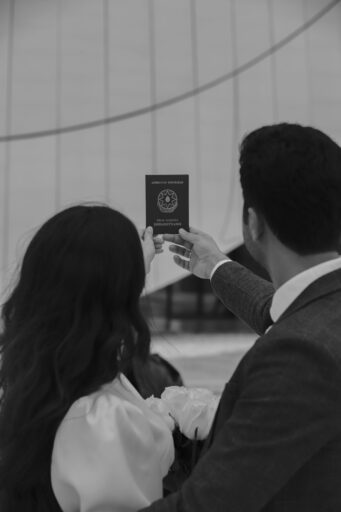Citizenship by marriage is a pathway many countries offer to foreign spouses, granting them the right to reside, work, and eventually naturalize in their partner’s country.
Countries that offer citizenship by marriage include France, Spain, Portugal, Mexico, and many more with varying residency requirements.
It can significantly shorten the time needed to qualify for nationality compared to regular residency routes.
This article explores:
- Which countries offer citizenship by marriage?
- What are the easiest citizenship by marriage countries?
- How fast can you become a citizen through marriage?
- What are the advantages of getting citizenship by marriage?
My contact details are hello@adamfayed.com and WhatsApp +44-7393-450-837 if you have any questions.
The information in this article is for general guidance only. It does not constitute financial, legal, or tax advice, and is not a recommendation or solicitation to invest. Some facts may have changed since the time of writing.

What is the meaning of citizenship acquired by marriage?
Citizenship acquired by marriage means that a foreign spouse becomes eligible to apply for the nationality of their partner’s country based on their marital status. This does not always guarantee automatic citizenship.
Instead, most countries grant residency first, followed by the option to apply for naturalization after meeting certain requirements, such as:
- A minimum number of years married and cohabiting
- Proof of integration (language skills, cultural knowledge, or ties to the country)
- Good conduct and financial stability
Some countries reduce the naturalization timeline significantly for foreign spouses, while others simply make the process faster compared to non-married applicants.
Citizenship by Marriage Countries List
Below is a regional breakdown of the most popular countries offering citizenship by marriage:
Europe
Europe is one of the most accommodating regions for foreign spouses. While rules differ, most countries grant citizenship faster than normal naturalization routes.
- Spain – Foreign spouses can apply for citizenship after just 1 year of marriage and residence.
- Portugal – Citizenship is available after 3 years of marriage, with or without residency if the couple maintains genuine ties.
- Italy – Foreign spouses may apply after 2 years of marriage (1.5 if residing in Italy).
- France – Citizenship is possible after 4 years of marriage (3 if the couple resides in France).
- Germany – Generally 3 years of residence while married before eligibility.
Other European countries offering citizenship by marriage: Belgium, Greece, Ireland, Netherlands, Sweden, Switzerland, Austria, Norway, Finland, Poland, Czech Republic, Hungary, and most other EU nations.
Americas
Marriage-based citizenship is common in the Americas, often with very short residency requirements.
- Brazil – Citizenship is possible after 1 year of marriage and residence.
- Argentina – Citizenship applications are open after just 2 years of continuous residence, and marriage strengthens the case.
- United States – A spouse of a US citizen can apply for naturalization after 3 years of holding a green card, instead of the usual 5.
- Canada – No direct citizenship by marriage, but foreign spouses benefit from streamlined residency sponsorship, leading to naturalization in about 3 years.
- Mexico – Foreign spouses can apply after 2 years of marriage and residence.
Other countries in the Americas offering citizenship by marriage: Colombia, Dominican Republic, Ecuador, Peru, Chile, Uruguay, Paraguay, Costa Rica, Panama, Honduras, and Venezuela.
Asia
Asia is more restrictive, but several countries still allow citizenship by marriage with strict conditions.
- South Korea – Citizenship is possible after 2 years of marriage and residence, or 3 years of marriage without continuous residence.
- Japan – No fixed waiting period, but generally 3 years of marriage and 1 year of residence is required.
- Philippines – Spouses can acquire citizenship after naturalization, with streamlined residency compared to other foreigners.
- Thailand – Spouses may apply for permanent residence after 3 years of marriage, and citizenship after 5 years.
- India – Citizenship is possible after 7 years of marriage and residence, though approvals are discretionary.
Other Asian countries offering citizenship by marriage: Cambodia, Malaysia (case-by-case), Indonesia, Kyrgyzstan, Kazakhstan, and Mongolia.
Middle East & Africa
The Middle East and Africa have mixed approaches; some allow relatively quick pathways, while others offer it only under strict oversight.
- Turkey – Citizenship is available after 3 years of marriage, provided the couple lives together and the marriage is genuine.
- Egypt – Foreign wives of Egyptian men can apply after 2 years of marriage.
- Morocco – Spouses can apply for citizenship after 5 years of marriage and residence.
- South Africa – Citizenship applications possible after 2 years of permanent residence through marriage.
- Jordan – Foreign wives of Jordanian men may apply for citizenship after 3 years of marriage if they are of Arab nationality, or after 5 years if they are non-Arab or residing abroad.
Other Middle Eastern and African countries offering citizenship by marriage: Tunisia, Algeria, Lebanon, Syria, Saudi Arabia (very limited), Israel, Cape Verde, Nigeria, and Ghana.
Can you get Singapore citizenship by marriage?

Yes, marriage to a Singaporean citizen can create a pathway to citizenship, but it is not automatic.
A foreign spouse must first become a Permanent Resident (PR).
After holding PR status for at least two years and being married to a Singapore citizen for at least two years, they become eligible to apply for citizenship.
The application is sponsored by the Singaporean spouse and reviewed by the Immigration and Checkpoints Authority (ICA).
Approval depends on factors such as:
- Financial stability and economic contributions
- Length of residence and family ties in Singapore
- Education, age, and professional qualifications
- Commitment to integrating into Singaporean society
So while marriage does open the door, citizenship is never guaranteed and depends heavily on the applicant’s overall profile.
Can I get Chinese citizenship by marriage?
Yes, but it is not automatic. Under the Nationality Law of the People’s Republic of China, a foreign spouse may apply for Chinese citizenship if they have been married to a Chinese citizen for at least five years.
During this time, they must also have maintained residence in China for at least 9 months per year across those five consecutive years, with proof of a stable income and legal residence.
The process requires submitting an application through the local Public Security Bureau’s Exit and Entry Administration Department, along with:
- A valid foreign permanent resident ID card
- The marriage certificate
- Documentation proving residence and financial means
Even if all conditions are met, approval is highly discretionary, and naturalization cases in China remain exceptionally rare compared to other countries.
Marriage creates the legal eligibility, but there is no guarantee of success.
What is the easiest country to get citizenship through marriage?
The easiest countries to get citizenship by marriage often combine short residency requirements, strong legal protections for spouses, and relatively quick naturalization. Examples include:
- France – Citizenship possible after 3 years of marriage (2 if the couple resides in France).
- Italy – Spouses can apply after 2 years of marriage (1.5 if living in Italy).
- Spain – Reduced residency requirement of just 1 year if married to a Spanish citizen.
- Brazil – One of the fastest worldwide, offering citizenship after 1 year of marriage and residency.
- Argentina – Foreign spouses can apply for citizenship after 2 years of residency, regardless of nationality.
These options stand out as easiest because they shorten the waiting time compared to the standard 5–10 years required for regular naturalization.
How fast can you get citizenship through marriage?
The speed depends entirely on the country:
- Fast-track examples: Brazil (1 year), Spain (1 year), and France (2–3 years).
- Moderate timelines: Italy (2–3 years), Mexico (2 years), and Argentina (2 years of residency).
- Slower processes: The United States offers a 3-year timeline for naturalization after obtaining a green card through marriage, faster than the usual 5 years.
On the other hand, some countries like Switzerland or Germany may still require 5+ years of marriage and residence before allowing a citizenship application, even for spouses.
What are the advantages of citizenship by marriage route?
Choosing the marriage route to citizenship offers several advantages including:
- Faster timelines – Many countries shorten the residency requirement for spouses, sometimes cutting the wait from 5–10 years to as little as 1–3 years.
- Lower costs – Unlike citizenship by investment programs, the marriage route typically does not require large financial commitments beyond application and legal fees.
- Right to reside and work – Spousal visas or residence permits often grant immediate rights to live and work in the country, even before citizenship is approved.
- Family unity – This pathway enables couples to settle together legally without long separations or complex visa hurdles.
- Path to dual nationality – In countries that allow dual citizenship, the spousal route may open access to a second passport without requiring you to give up your original one.
- Cultural integration – Living with a citizen spouse often strengthens an applicant’s case by demonstrating ties, stability, and long-term commitment to the country.
Conclusion
Citizenship by marriage can be one of the most practical routes for couples who wish to settle in the same country.
However, the benefits and timelines vary widely across the globe: some countries grant fast-track access, while others impose long residency and integration requirements regardless of marital status.
For expats and high-net-worth individuals, understanding which countries offer realistic pathways through marriage can help in long-term planning whether for family unity, mobility, or tax-efficient relocation.
FAQs
What is another name for citizenship by marriage?
Another name is jus matrimonii, a Latin term meaning the right to citizenship through marriage.
It is also commonly referred to as spousal naturalization or marriage-based citizenship.
What are the 4 types of citizenship?
The four common types of citizenship are:
Citizenship by birth – being born in a country that grants nationality automatically.
Citizenship by descent – having parents (sometimes grandparents) who are citizens.
Citizenship by naturalization – applying for citizenship after meeting residency and integration requirements.
Citizenship by marriage – acquiring nationality through marriage to a citizen, usually after a residency period.
What happens if you are to be deported but just got married?
Marriage does not automatically stop deportation. Immigration authorities will review the case to determine if the marriage is genuine and if the foreign spouse qualifies for a legal residency pathway.
If the marriage is considered a sham or if the applicant is otherwise ineligible, deportation can still proceed.
Pained by financial indecision?

Adam is an internationally recognised author on financial matters with over 830million answer views on Quora, a widely sold book on Amazon, and a contributor on Forbes.



